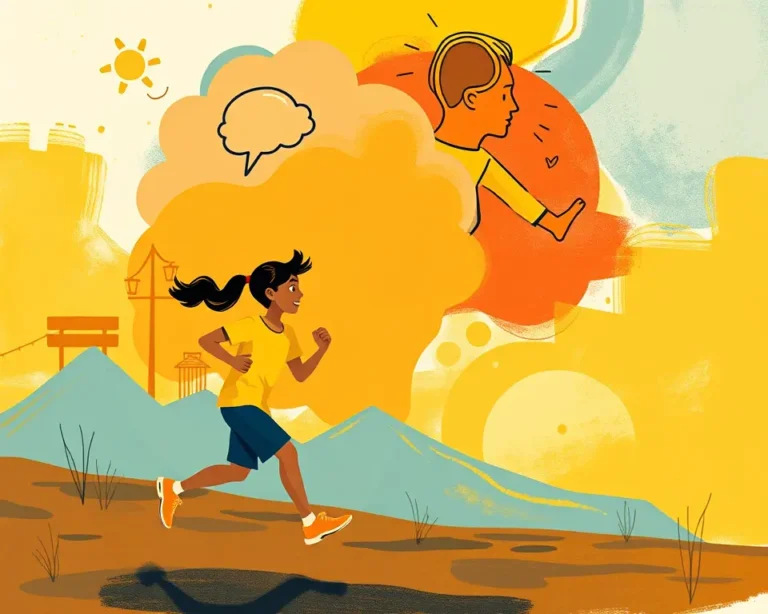Mental Health Awareness Month is a crucial time to emphasize the connection between physical fitness and mental well-being, especially in youth. In today’s world, young people face numerous challenges that can impact their mental health, including academic pressures, social anxieties, and the ever-present influence of social media. Integrating fitness into their lives can be a powerful tool to combat these stressors and promote a healthier, happier generation.
The Vital Link Between Fitness and Mental Health
Exercise isn’t just about building strong bodies; it’s also about cultivating strong minds. Studies increasingly show that physical activity can significantly improve mental and emotional health in the short and long term.
How Exercise Boosts Mental Well-being
- Releases “Feel-Good” Chemicals: Exercise stimulates the release of endorphins, dopamine, and serotonin in the brain, which are natural mood boosters that can alleviate symptoms of depression and anxiety.
- Reduces Stress and Anxiety: Physical activity helps lower stress hormones and can curb negative thinking patterns. Even small improvements in fitness can lead to a significant reduction in the risk of developing anxiety, depression, and ADHD.
- Improves Sleep: Regular exercise can promote better sleep quality, which is essential for mental and emotional restoration.
- Sharpens Thinking and Improves Academic Performance: Being active is associated with improvements in concentration, decision-making abilities, attention, and academic performance. Studies have also found positive links between physical activity and performance in math and reading skills.
- Builds Self-Esteem and Confidence: Engaging in different types of exercise allows children and teens to develop their self-esteem as they experience the sense of mastery that comes with practice.
- Combats Social Isolation: Participating in team sports or group fitness activities can provide opportunities for social interaction and connection, reducing feelings of loneliness and isolation. A study of over 17,000 teenagers revealed that those who participated in sports clubs were 60% less likely to experience depression compared to inactive kids.
Addressing the Challenges
Despite the clear benefits, many young people today are not getting enough physical activity. Factors contributing to this include:
- Sedentary Lifestyles: Increased screen time and decreased outdoor play have led to more sedentary behaviors.
- School Constraints: Academic pressures may lead to reduced physical activity time in schools.
- Lack of Access: Not all children have access to safe and affordable sports programs or recreational facilities.
The Impact of Screen Time
Excessive screen time has been linked to various mental health issues in children and adolescents. These include:
- Increased risk of depression and anxiety.
- Sleep disturbances.
- Impaired emotional comprehension.
- Increased aggression.
- Reduced social abilities.
A recent study found that adolescents who spent more than three hours a day on screen-based leisure activities showed significantly greater psychological distress three years later, with video games being particularly influential. Conversely, moderate screen exposure (60-119 minutes per day) invested in educational activities was considered a “protective” factor.
The Role of Nutrition
Nutrition plays a key role in promoting overall mental health, particularly for developing children.
- Brain Fuel: The brain is an energy-intensive organ, and what young people eat directly fuels their brain.
- Impact on Mood: Diets high in processed foods, refined sugars, and unhealthy fats can contribute to mood swings and poor concentration, while diets rich in whole foods provide the nutrients necessary for optimal brain function and emotional resilience.
- Essential Nutrients: Omega-3 fatty acids, antioxidants, and complex carbohydrates are particularly beneficial for brain health and mood stability. Studies show that adolescents who consumed at least three servings of fruit and two servings of vegetables daily had the lowest mental disorder symptoms.
Practical Strategies for Promoting Youth Fitness
Here are actionable ways to encourage youth fitness and support their mental health:
1. Make it Fun and Engaging
- Find Activities They Enjoy: Encourage kids to explore different sports, dance, outdoor adventures, or other activities to discover what they love.
- Incorporate Play: Instead of focusing solely on structured exercise, incorporate play and movement into their daily routines. This could include playing in the backyard, running at recess, or walking the dog.
- Make it Social: Encourage group activities or team sports to foster social connections and make exercise more enjoyable.
2. Set Realistic Goals and Provide Support
- Start Small: Begin with achievable goals and gradually increase the intensity and duration of physical activity.
- Be a Role Model: Parents and caregivers can lead by example by incorporating physical activity into their own lives.
- Offer Encouragement: Celebrate effort and progress, rather than just focusing on outcomes.
- Create a Supportive Environment: Ensure that physical activities are done in a safe and fun way.
3. Limit Screen Time and Promote Balance
- Establish Boundaries: Set reasonable limits on recreational screen time.
- Encourage Alternative Activities: Promote engagement in hobbies, outdoor activities, and social interactions.
- Create Tech-Free Zones: Designate certain times or areas as tech-free, such as during meals or before bedtime.
4. Emphasize Healthy Nutrition
- Balanced Diet: Encourage a diet rich in fruits, vegetables, whole grains, and lean proteins.
- Limit Processed Foods: Reduce the intake of sugary drinks, processed snacks, and fast food.
- Involve Kids in Meal Preparation: Cooking classes can empower teens to make healthier choices and show them how food can be a tool for both physical and mental wellness.
- Family Meals: Eating dinner together as a family can be a powerful protective factor for preventing mental illness in children.
5. Parental Involvement and Open Communication
- Active Participation: Parents play a crucial role in shaping adolescents’ physical activity and mental health.
- Open Communication: Create a safe space where teens feel comfortable expressing their emotions and seeking help when needed.
- Support and Understanding: Show unconditional love and support, and work through conflicts together.
- Parental Self-Care: Parents must prioritize their own well-being to effectively support their teens’ mental health.
6. School and Community Programs
- Promote Mental Fitness in Schools: Integrating mental fitness into school curricula can equip young people with the tools they need to navigate life’s challenges.
- Offer Free Programs: Active Kids is a free physical activity program that improves children physically, mentally, and socially through movement.
- Utilize Community Resources: ConnectME links children, youth, and their caregivers to nearby mental health services that uplift who they are.
7. Activities for Mental Health Awareness Month
- Positive Affirmations: Design a bulletin board featuring uplifting quotes and messages of encouragement.
- Gratitude Wall: Set up a gratitude wall where kids can share what they’re grateful for.
- “I Feel” Exercise: Encourage children to share what they’re experiencing through daily mental health check-ins.
- Journaling: Journaling can be a helpful tool for expressing emotions, reflecting on experiences, and tracking personal growth.
- Mindfulness Activities: Incorporate mindfulness exercises such as breathing exercises and sense scavenger hunts.
Resources and Support
There are numerous resources available to support youth mental health and fitness:
- Active Kids: Offers free before- and after-school exercise programs.
- AIS Mental Fitness Program: A free interactive program for high-school aged young people.
- Black Dog Institute: Provides a range of youth mental health resources.
- California Parent & Youth Helpline: Offers free support via call, text, or live chat.
- Crisis Text Line: Text HOME to 741741 for free, 24/7 crisis support.
- Mental Health First Aid: Teaches teens about different types of mental health problems and crises.
- National Alliance on Mental Illness (NAMI): Provides information, referrals, and support for mental health.
- National Suicide Prevention Lifeline: Call or text 988 for immediate support.
- Smiling Mind: Offers an evidence-based mental fitness program to build lifelong skills.
- Youth Wellness Hubs Ontario: Provides information and resources for youth mental health.
By prioritizing youth fitness and mental well-being, we can empower young people to lead healthier, happier, and more fulfilling lives. This Mental Health Awareness Month, let’s commit to making a positive change in the lives of our youth, one step and one breath at a time.







